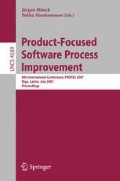Abstract
Many organizations have turned toward globally distributed software development in their quest for higher-quality software delivered cheaply and quickly. But this kind of development has often been reported as problematic and complex to manage. One of the fundamental factors in determining the success and failure of globally distributed software teams is trust. The aim of our work has therefore been to describe the key factors causing lack of trust, and the main effects of lacking trust in such teams. From studying 4 projects, all located in two different countries, with trust problems we found the key factors to be poor socialization and socio-cultural fit, lack of face-to-face meetings, missing conflict handling and cognitive based trust, increased monitoring and too little communication. The effect of lacking trust was a decrease in productivity, quality, information exchange, feedback and morale among the employees; the monitoring increased and the employees doubted negative feedback from manager.
Access this chapter
Tax calculation will be finalised at checkout
Purchases are for personal use only
Preview
Unable to display preview. Download preview PDF.
References
Bandow, D.: Time to create sound teamwork. The Journal for quality and participation 24(2), 41 (2001)
Bhat, J.M., Gupta, M., Murthy, S.N.: Overcoming requirements engineering challenges: Lessons from offshore outsourcing. IEEE Software 23(5), 38-+ (2006)
Carmel, E.: Global software teams: collaborating across borders and time zones. Prentice-Hall, Englewood Cliffs (1999)
Damian, D., Moitra, D.: Global software development: How far have we come? Ieee Software 23(5), 17–19 (2006)
Davidson, E.J., Tay, A.S.M.: Studying teamwork in global IT support (2003)
DeLone, W., et al.: Bridging global boundaries for IS project success. In: 38th Hawaii International Conference on System Scienc 2005. Big Island, HI, United States: Institute of Electrical and Electronics Engineers Computer Society, Piscataway, NJ 08855-1331, United States (2005)
Dingsøyr, T.: Postmortem reviews: purpose and approaches in software engineering. Information and Software Technology 47(5), 293–303 (2005)
Dingsøyr, T., et al.: A workshop-oriented approach for defining electronic process guides - A case study. In: Acuña, S.T., Juristo, N. (eds.) in Software Process Modelling, pp. 187–205. Kluwer Academic Publishers, Boston (2004)
Dirks, K.T., Ferrin, D.L.: The role of trust in organizational settings. Organization Science 12(4), 450–467 (2001)
Duarte, D.L., Snyder, L.T.: Mastering Virtual Teams: Strategies, Tools, and Techniques that Succeed, 2nd edn. A.W. Company, Jossey-Bass (2001)
Edwards, H.K., Sridhar, V.: Analysis of the effectiveness of global virtual teams in software engineering projects (2003)
Grabowski, M., Roberts, K.H.: Risk mitigation in virtual organizations. Organization Science 10(6), 704–721 (1999)
Jarvenpaa, S.L., Knoll, K., Leidner, D.E.: Is anybody out there? Antecedents of trust in global virtual teams. Journal of Management Information Systems 14(4), 29–64 (1998)
Jarvenpaa, S.L., Leidner, D.E.: Communication and trust in global virtual teams. Organization Science 10(6), 791–815 (1999)
Jarvenpaa, S.L., Shaw, T.R., Staples, D.S.: Toward contextualized theories of trust: The role of trust in global virtual teams. Information Systems Research 15(3), 250–267 (2004)
Kanawattanachai, P., Yoo, Y.: Dynamic nature of trust in virtual teams. Journal of Strategic Information Systems 11(3-4), 187–213 (2002)
Karolak, D.W.J.: Global software development. IEEE Computer Society Press, Los Alamitos (1998)
Martins, L.L., Gilson, L.L., Maynard, M.T.: Virtual teams: What do we know and where do we go from here? Journal of Management 30(6), 805–835 (2004)
Piccoli, G., Ives, B.: Trust and the unintended effects of behavior control in virtual teams. Mis. Quarterly 27(3), 365–395 (2003)
Rocco, E.: Trust breaks down in electronic contexts but can be repaired by some initial face-to-face contact, Los Angeles, CA, USA. ACM, New York, NY, USA (1998)
Sahay, S., Nicholson, B., Krishna, S.: Global IT outsourcing: software development across borders. Cambridge University Press, Cambridge (2003)
Salas, E., Sims, D.E., Burke, C.S.: Is there a big five in teamwork? Small Group Research 36(5), 555–599 (2005)
Smite, D., Borzovs, J.: A framework for overcoming supplier related threats in global projects. In: Richardson, I., Runeson, P., Messnarz, R. (eds.) EuroSPI 2006. LNCS, vol. 4257, pp. 50–61. Springer, Heidelberg (2006)
Vanzin, M., et al.: Global software processes definition in a distributed environment. Greenbelt, MD, United States: Institute of Electrical and Electronics Engineers Computer Society, Piscataway, NJ 08855-1331, United States (2005)
Webber, S.S.: Leadership and Trust Facilitating Cross-functional Team Success. The Journal of management development 21(3), 201 (2002)
Yin, R.K.: Case Study Research: design and methods, 3rd edn. vol. 5. Sage Publications, Thousand Oaks, CA (2003)
Ågerfalk, P.J.: Special Issue: Flexible and distributed software processes: old petunias in new bowls? table of contents. Communications of the ACM 49(10), 26 (2006)
Author information
Authors and Affiliations
Editor information
Rights and permissions
Copyright information
© 2007 Springer-Verlag Berlin Heidelberg
About this paper
Cite this paper
Moe, N.B., Šmite, D. (2007). Understanding Lacking Trust in Global Software Teams: A Multi-case Study. In: Münch, J., Abrahamsson, P. (eds) Product-Focused Software Process Improvement. PROFES 2007. Lecture Notes in Computer Science, vol 4589. Springer, Berlin, Heidelberg. https://doi.org/10.1007/978-3-540-73460-4_6
Download citation
DOI: https://doi.org/10.1007/978-3-540-73460-4_6
Publisher Name: Springer, Berlin, Heidelberg
Print ISBN: 978-3-540-73459-8
Online ISBN: 978-3-540-73460-4
eBook Packages: Computer ScienceComputer Science (R0)

